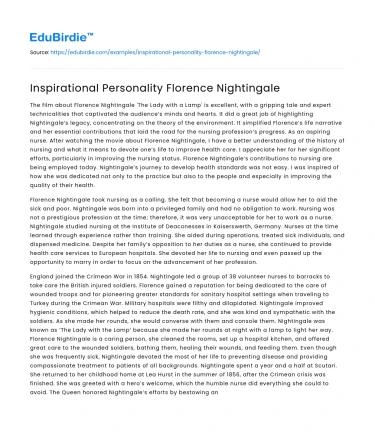The film about Florence Nightingale 'The Lady with a Lamp' is excellent, with a gripping tale and expert technicalities that captivated the audience’s minds and hearts. It did a great job of highlighting Nightingale’s legacy, concentrating on the theory of the environment. It simplified Florence’s life narrative and her essential contributions that laid the road for the nursing profession’s progress. As an aspiring nurse. After watching the movie about Florence Nightingale, I have a better understanding of the history of nursing and what it means to devote one’s life to improve health care. I appreciate her for her significant efforts, particularly in improving the nursing status. Florence Nightingale’s contributions to nursing are being employed today. Nightingale’s journey to develop health standards was not easy. I was inspired of how she was dedicated not only to the practice but also to the people and especially in improving the quality of their health.
Florence Nightingale took nursing as a calling. She felt that becoming a nurse would allow her to aid the sick and poor. Nightingale was born into a privileged family and had no obligation to work. Nursing was not a prestigious profession at the time; therefore, it was very unacceptable for her to work as a nurse. Nightingale studied nursing at the Institute of Deaconesses in Kaiserswerth, Germany. Nurses at the time learned through experience rather than training. She aided during operations, treated sick individuals, and dispensed medicine. Despite her family’s opposition to her duties as a nurse, she continued to provide health care services to European hospitals. She devoted her life to nursing and even passed up the opportunity to marry in order to focus on the advancement of her profession.
Save your time!
We can take care of your essay
- Proper editing and formatting
- Free revision, title page, and bibliography
- Flexible prices and money-back guarantee
England joined the Crimean War in 1854. Nightingale led a group of 38 volunteer nurses to barracks to take care the British injured soldiers. Florence gained a reputation for being dedicated to the care of wounded troops and for pioneering greater standards for sanitary hospital settings when traveling to Turkey during the Crimean War. Military hospitals were filthy and dilapidated. Nightingale improved hygienic conditions, which helped to reduce the death rate, and she was kind and sympathetic with the soldiers. As she made her rounds, she would converse with them and console them. Nightingale was known as ‘The Lady with the Lamp’ because she made her rounds at night with a lamp to light her way. Florence Nightingale is a caring person, she cleaned the rooms, set up a hospital kitchen, and offered great care to the wounded soldiers, bathing them, healing their wounds, and feeding them. Even though she was frequently sick, Nightingale devoted the most of her life to preventing disease and providing compassionate treatment to patients of all backgrounds. Nightingale spent a year and a half at Scutari. She returned to her childhood home at Lea Hurst in the summer of 1856, after the Crimean crisis was finished. She was greeted with a hero’s welcome, which the humble nurse did everything she could to avoid. The Queen honored Nightingale’s efforts by bestowing an engraved brooch known as the ‘Nightingale Jewel’ on her and awarding her a $250,000 prize from the British government.
Florence Nightingale didn’t have a job; she had a mission. Before taking her team of young nurses to the Crimea, she did not inquire about pay and benefits, and she suffered working conditions that would be deemed unacceptable in today’s society and her dedication to her job profoundly impacted the world of healthcare.
She was idolized by young women who wished to be like her. Even wealthy upper-class ladies began enrolling at the training school, eager to follow in her footsteps. Nursing was no longer frowned upon by the upper classes thanks to Nightingale; in fact, it had grown to be seen as a respectable profession. I learned from Florence Nightingale that when it comes in chasing your dreams, you should be fully devoted and conceive of your dream as a mission to complete. When it comes to pursuing your aspirations, there should be no hesitation. While pursuing your dreams, you will frequently encounter situations in which you must persuade not only others but also yourself. Before pursuing your goal, you should examine your strengths and weaknesses. So that you can reach your goal, try to correct your deficiencies wherever they are and focus on your strengths. Her life tells us that to reach this point, you must not only be enthusiastic about your aim, but also that if you never miss an opportunity, you will never miss your goal.






 Stuck on your essay?
Stuck on your essay?

